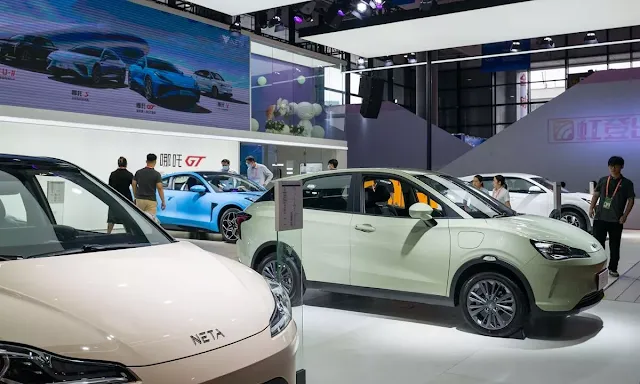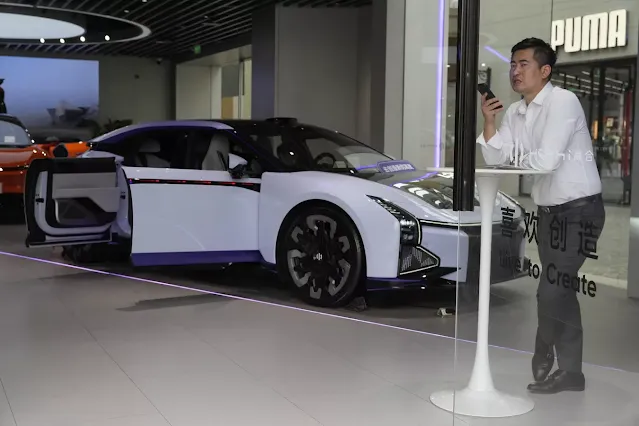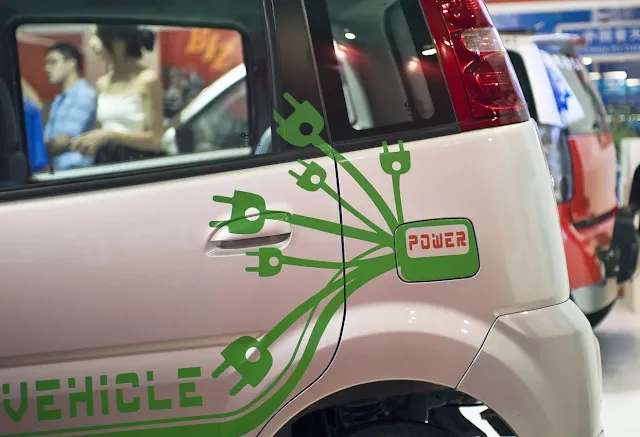China exported 5.22 million vehicles in 2023, becoming the world's largest auto exporter. About a third of all car exports were new energy vehicles (NEVs), totaling 1.773 million units, up 67.1 percent year-on-year, according to statistics released by the General Customs Service on Friday.
The export figures reflect the remarkable achievements made by China's auto industry in the transition to auto electrification and intelligence, which will also accelerate the transformation process of the global auto industry, industry insiders said.
This industry shift was illustrated by the latest high-tech products from Chinese automakers unveiled at the Consumer Electronics Show (CES) 2024 in Las Vegas from January 7 to 10.
For example, a subsidiary of Chinese electric vehicle (EV) manufacturer Xpeng unveiled its “flying car” concept model at the event. The electric vertical take-off and landing vehicle will be available for pre-order from the fourth quarter of 2024, with the aim of first delivery in the fourth quarter of 2025, the company said.
The industrial transition to electrification and intelligence also enabled BYD to overtake Tesla and become the world's largest electric vehicle manufacturer by the fourth quarter of 2023.
Modernization of the industrial chain
An industry insider, Zhang, told the Global Times that currently, almost all cars made in China, especially NEVs, are smart because they have smart features such as autopilot and voice control. “It is quite embarrassing for Chinese automakers to introduce a new car without smart features.”
China's auto production exceeded 30.16 million units in 2023, up 11.6 percent year-on-year, and sales exceeded 30.09 million units, up 12 percent, according to data released by the China Association of China on Thursday Automobile Manufacturers (CAAM). According to CAAM, both production and sales have set new records and have been ranked first in the world for 15 years in a row.
China in particular produced 9.587 million NEVs in 2023, 35.8 percent more than the previous year. NEV sales reached 9.495 million units, an increase of 37.9 percent, resulting in a NEV penetration rate of 31.6 percent, CAAM said.
Smart car manufacturing can advance many industries, including software, hardware, chips, sensors, industrial data and more. A car is a bigger application terminal than a mobile phone and can promote the development of many high-tech industries and vice versa, Zhang said.
A typical smart car is equipped with about 1,700 chips, an executive at a Chinese chip parts supplier that works closely with the auto industry told the Global Times.
According to a recent report by AskCI Consulting Co, a Chinese industrial consulting firm, the size of China's automotive chip market was approximately 79.46 billion yuan ($11.1 billion) in 2022 and is expected to reach 90.54 billion yuan by 2024 reaches.
So far, major NEV industrial centers have been built in the Yangtze River Delta in eastern China, the Pearl River Delta in southern China and the Chengdu-Chongqing Economic Circle in southwestern China.
These NEV hubs have attracted more than 1,000 domestic and foreign companies, forming a complete and organic cooperative industrial chain and supply chain system for NEVs, covering the entire chain of basic materials, components and vehicle production.
Worldwide leading
Industry insiders pointed out that the production and sale of intelligent cars in China, which is now leading the global market, has promoted the development of the entire industrial chain and related technologies.
Zhang cited LiDAR, which has been described as “eyes” for cars. Chinese suppliers produce and ship hundreds of thousands of sets for domestic and foreign automakers every month.
According to industry media HiEV, nearly 600,000 LiDAR units were delivered in passenger vehicles in China alone in 2023, up from around 160,000 in 2022.
“The LiDAR market was first led by American suppliers like Velodyne. But soon the market was largely replaced by RoboSense Technology Co and Hesai Technology, two Chinese lidar manufacturers. Their success is largely due to the huge Chinese car market,” said Zhang, adding that Chinese lidar is now also widely used in foreign car brands.
At this year's CES event, RoboSense introduced the latest sensors in its M platform range, used for advanced driver assistance and autonomy.
“As the world's first lidar company to achieve mass production of solid-state LiDAR for the automotive industry, in addition to notable production and delivery milestones, CES 2024 is the perfect stage to bring the latest industry-leading solutions from our M platform to market .” Steven Qui, CEO and founder of Robosense, in a statement sent by the company to the Global Times.
Hesai, who also attended CES 2024, recently completed construction of a new 70,000-square-foot research and development (R&D) center in Shanghai called Maxwell, the company told the Global Times.
“Our new Maxwell facility is not a traditional manufacturing facility, but rather an advanced research and development center where we design and build automated lidar production lines that can then be easily replicated across our global network of manufacturing facilities,” said David Li, co-founder and CEO of Hesai.
The facility includes the world's most advanced lidar testing laboratory and will deploy many intelligent industrial robots, enabling the automation of more than 100 manufacturing processes with a 90 percent automation rate and a cycle time of 45 seconds per lidar unit, Hesai said.
A Chinese manufacturer of high-precision positioning products told the Global Times that the company plans to set up new production lines in early 2024 to better serve domestic and foreign markets amid the rapidly developing automotive industry.
According to national standards, there are six levels of autonomous driving, ranging from level 0 to level 5. From level 3, vehicles are considered conditionally autonomous.
According to analysts, 2024 is expected to be the year of the explosive development of autonomous driving technology.
Although China is a relative laggard in autonomous driving compared to the United States, China has been catching up in the past three years and building a similar strength to the United States, said Zhang Xiang, director of Digital Automotive International Cooperation Research. Center at the World Digital Economy Forum, told the Global Times.
“The next three years will be a crucial period for the commercialization and large-scale deployment of advanced autonomous driving functions in China,” said Zhang, the director.























